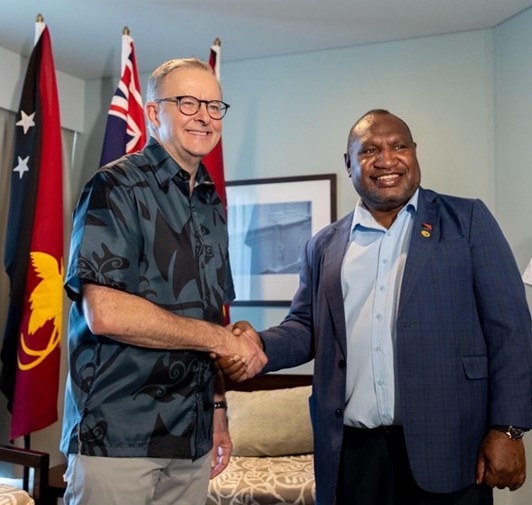The Australian government is refusing to say how much it is paying to Papua New Guinea in a secret agreement to hold about 75 refugees and asylum seekers in Port Moresby.
Parliamentary documents have revealed for the first time this week that the Morrison government signed a “confidential bilateral agreement” with PNG in December 2021, paying the PNG government to provide welfare and support for refugees forcibly sent to PNG by Australia.
The Morrison government did not announce the existence of the agreement, and, more than 18 months later, the Albanese government has consistently refused to provide any detail, saying that information would do “damage to the international relations of the commonwealth [of Australia]”.
About 75 refugees and asylum seekers are still held in PNG, most in the capital Port Moresby, having been sent offshore a decade ago by Australia as part of its illegal offshore detention regime on Manus Island. That detention centre was ruled unconstitutional by the PNG supreme court in 2016, which ordered it shut.
The refugees and asylum seekers still in PNG say they live in a state of limbo, facing an uncertain, precarious future. Most suffer acute physical and mental health conditions.
In December 2021, Australia announced it had ended offshore processing in PNG but did not declare it had signed a secret agreement to pay PNG to provide welfare and support for the people still held there.
The Australian government has since refused to answer questions on its agreement with PNG.
Independent senator for the ACT David Pocock asked a series of questions in Senate estimates about Australia’s funding to PNG.
In responses received this week, the Department of Home Affairs, for the first time, revealed it had signed the “Funding Arrangement Supporting Papua New Guinea’s Independent Management of the Residual Regional Processing Caseload” in December 2021, but would not disclose how much Australia was paying, or for how long the agreement would run.
“The details of the funding arrangement remain confidential,” the department said. The arrangement is funded, this year, from within Australia’s US$303m irregular maritime arrival “offshore management” budget.
An earlier freedom of information request by the Asylum Seeker Resource Centre for similar information was rejected on the grounds “that the release … could reasonably be expected to cause damage to the Australian government’s international relations”.
Pocock told the Guardian it was “deeply concerning” to discover the former government entered into a secretive “confidential bilateral agreement” with PNG’s immigration authority, without any disclosure.
“We don’t even know why the Department of Home Affairs entered into an agreement that prevents the amount of funding provided from being publicly disclosed.
“The Australian public deserves complete transparency of how much funding has been provided … and how it has been spent.”
Pocock said the Senate estimates process exists to provide an opportunity to interrogate government spending on behalf of all Australians.
“Our democracy is stronger and healthier when the process is fully respected.”
Ogy Simic, director of advocacy at the Asylum Seeker Resource Centre, said “almost nothing” is known of Australia’s offshore funding on PNG, “and that is by design”.
“It is the refugees still held offshore that are exposing this system, telling the world that there is money being poured into PNG to maintain the cruel system the Australian government has created.”
Simic said offshore processing “can only exist through dehumanisation and secrecy … keeping the cost secret is just an extension of this”.
Simic said despite the Australian taxpayer dollars flowing to PNG to provide support to refugees held there, there was no accountability for how that money was spent.
He said those held in Moresby report: their financial allowance is insufficient to buy enough food or other essentials; they now receive fewer medical appointments, and; they are having to fund their own medication.
Many report they feel unsafe where they are forced to live. Most have been the subject of repeated attacks and robberies, including being mugged at gunpoint.
Abdi Adan Muse, a refugee from Somalia who has been held in PNG for a decade, said the constant stress of a dangerous present, and an uncertain future, “has an impact on you psychologically – always thinking and constantly worrying”.
“Take me out of this place. I have been physically, and mentally tortured. I have been here a long time, nothing good comes out of this place, take me to a better place than here, I can’t handle more than 10 years.”
The Guardian put detailed questions to the Department of Home Affairs about the “confidential bilateral agreement” with PNG.
A spokesperson said those held in PNG “are under the independent management of the PNG government”.
“The department does not have any role in the ongoing management of, or service delivery arrangements for, individuals remaining in PNG and does not monitor the caseload.”
The department refused to answer questions on the cost, or duration, of the agreement.
“The details of the funding arrangement remain confidential. It is a matter for PNG to manage the ongoing funding to provide a range of settlement, welfare and health support to individuals remaining in PNG, said the spokesperson.
SOURCE: THE GUARDIAN/PACNEWS














